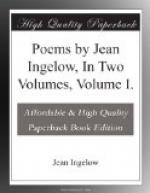He spoke to her and spoke to me;
The rebel rose-hue dyed her cheek;
The woven crown lay on her knee;
She
would not speak.
And I with doubtful pause—averse
To let occasion drift away—
I answered—“If his case were worse
Than
word can say,
“Time is a healer of sick hearts,
And women have been known to choose,
With purpose to allay their smarts,
And
tend their bruise,
“These for themselves. Content to give,
In their own lavish love complete,
Taking for sole prerogative
Their
tendance sweet.
“Such meeting in their diadem
Of crowning love’s ethereal fire,
Himself he robs who robbeth them
Of
their desire.
“Therefore the man who, dreaming, cried
Against his lot that even-song,
I judge him honest, and decide
That
he was wrong.”
“When I am judged, ah may my fate,”
He whispered, “in thy code be read!
Be thou both judge and advocate.”
Then
turned, he said—
“Fair weaver!” touching, while he spoke,
The woven crown, the weaving hand,
“And do you this decree revoke,
Or
may it stand?
“This friend, you ever think her right—
She is not wrong, then?” Soft and
low
The little trembling word took flight:
She
answered, “No.”
PRESENT.
A meadow where the grass was deep,
Rich, square, and golden to the view,
A belt of elms with level sweep
About
it grew.
The sun beat down on it, the line
Of shade was clear beneath the trees;
There, by a clustering eglantine,
We
sat at ease.
And O the buttercups! that field
O’ the cloth of gold, where pennons
swam—
Where France set up his lilied shield,
His
oriflamb,
And Henry’s lion-standard rolled:
What was it to their matchless sheen,
Their million million drops of gold
Among
the green!
We sat at ease in peaceful trust,
For he had written, “Let us meet;
My wife grew tired of smoke and dust,
And
London heat,
“And I have found a quiet grange,
Set back in meadows sloping west,
And there our little ones can range
And she can rest.
“Come down, that we may show the view,
And she may hear your voice again,
And talk her woman’s talk with you
Along the lane.”
Since he had drawn with listless hand
The letter, six long years had fled,
And winds had blown about the sand,
And they were wed.
Two rosy urchins near him played,
Or watched, entranced, the shapely ships
That with his knife for them he made
Of elder slips.
And where the flowers were thickest shed,
Each blossom like a burnished gem,
A creeping baby reared its head,
And cooed at them.




